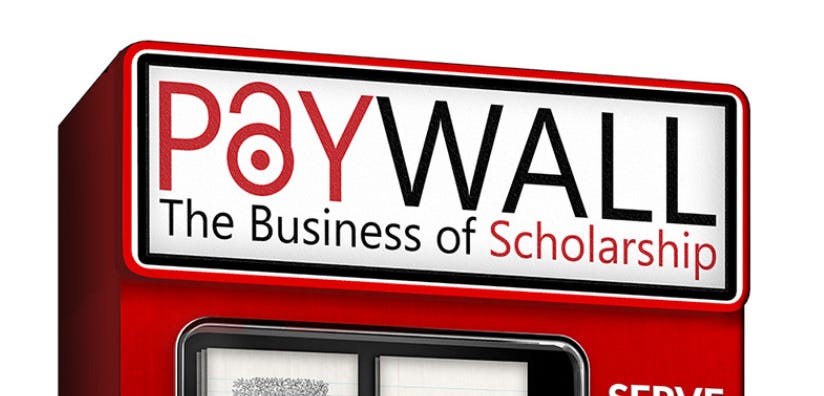I teach library history1 at an R1 university2 with an outstanding library. With a single sign-in I have electronic access to paywalled academic and popular journals and scholarly books..and if the library doesn’t have what I need, the interlibrary loan department will get it for me w/in 24 hours.3
Sometimes I try to look something up on the Internet w/o using my library sign-in..like a regular person. Then I hit Paywalls on almost everything and what is left is a hodge-podge of websites with ads and usually sketchy sources. That is what an unlibraried person confronts. I could not afford but a very small number of personal subscriptions if I didn’t have access to a major library.
Open Access Movement
There is an Open Access movement.4 It is intended to democratize information, but it is not a solution yet. Here is an informative film. “PAYWALL: THE BUSINESS OF SCHOLARSHIP.”5
The Wikipedia Library-YOU CAN USE IT!
One solution available to everyone is the Wikipedia Library. To use it there are some requirements. You need to be a Wikipedia editor. This is easy.6
Then you need to be an active editor:
500+ edits
6+ months editing
10+ edits in the last month
No active blocks
The Wikipedia Library is an open research hub, a place for active Wikipedia editors to gain access to the vital reliable sources that they need to do their work and to be supported in using those resources to improve the encyclopedia. The Wikipedia Library aims to make access and use of sources free, easy, collaborative and efficient. There is access in many languages.
You can subscribe (free) to the Newsletter about The Wikipedia Library. In this month’s newsletter there is an update of newly available open-access materials:
Wiley – broad collections of online journals, books, and research resources, covering life, health, social, and physical sciences
OECD iLibrary, OECD Data, and OECD Multimedia Gallery – a repository of materials published by the Organisation for Economic Cooperation and Development (OECD).
The Open Access Movement is working to unlock paywalls, but until they succeed The Wikipedia Library will let you behind many paywalls. Do not be afraid of editing Wikipedia.7
I’m glad to e-mail with anyone who wants to know more: klmccook@gmail.com
Kathleen McCook, “Selected Works.”
There are 146 institutions classified as "R1: Doctoral Universities – Very high research activity" in the Carnegie Classification of Institutions of Higher Education as 2021. These universities have a very high level of both research activity and provide a lot of resources for research and have a lot of people conducting research at their respective institution.
Open Access Publishing : What is Open Access? Open access (OA) refers to freely available, digital, online information. Open access scholarly literature is free of charge and often carries less restrictive copyright and licensing barriers than traditionally published works, for both the users and the authors.
Paywall: The Business of Scholarship is a documentary which focuses on the need for open access to research and science.
When you edit Wikipedia you create a user page that keeps a record of all your edits. If you want to see my list of edits they are all here. I mostly add edits about libraries, librarians and books. I know if I’m ever unlibraried I can use the Wikipedia Library. That is a comfort.






Thank you very much for the info.
elm
c'est ridicule
O yes, the dreaded IRB.